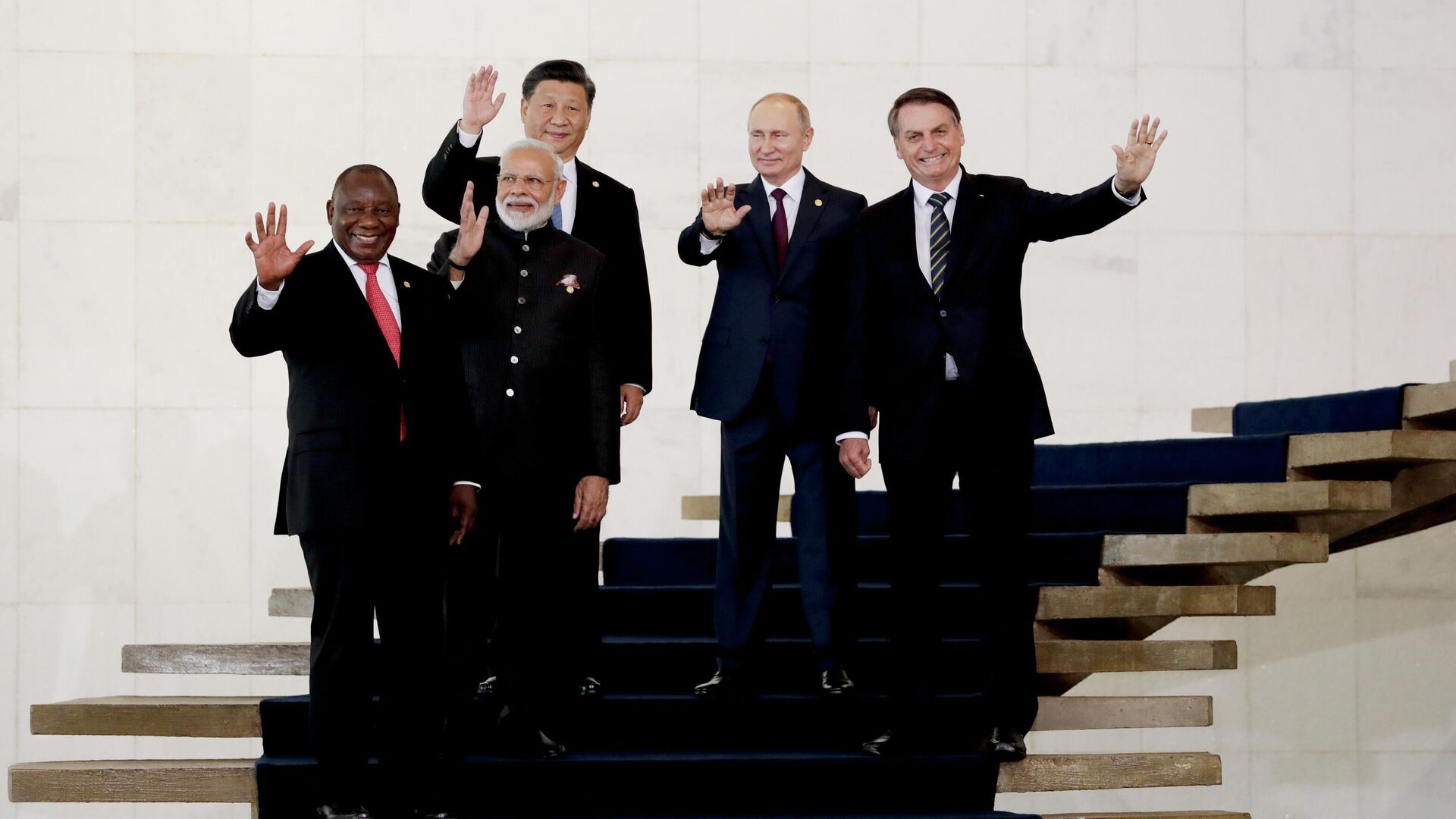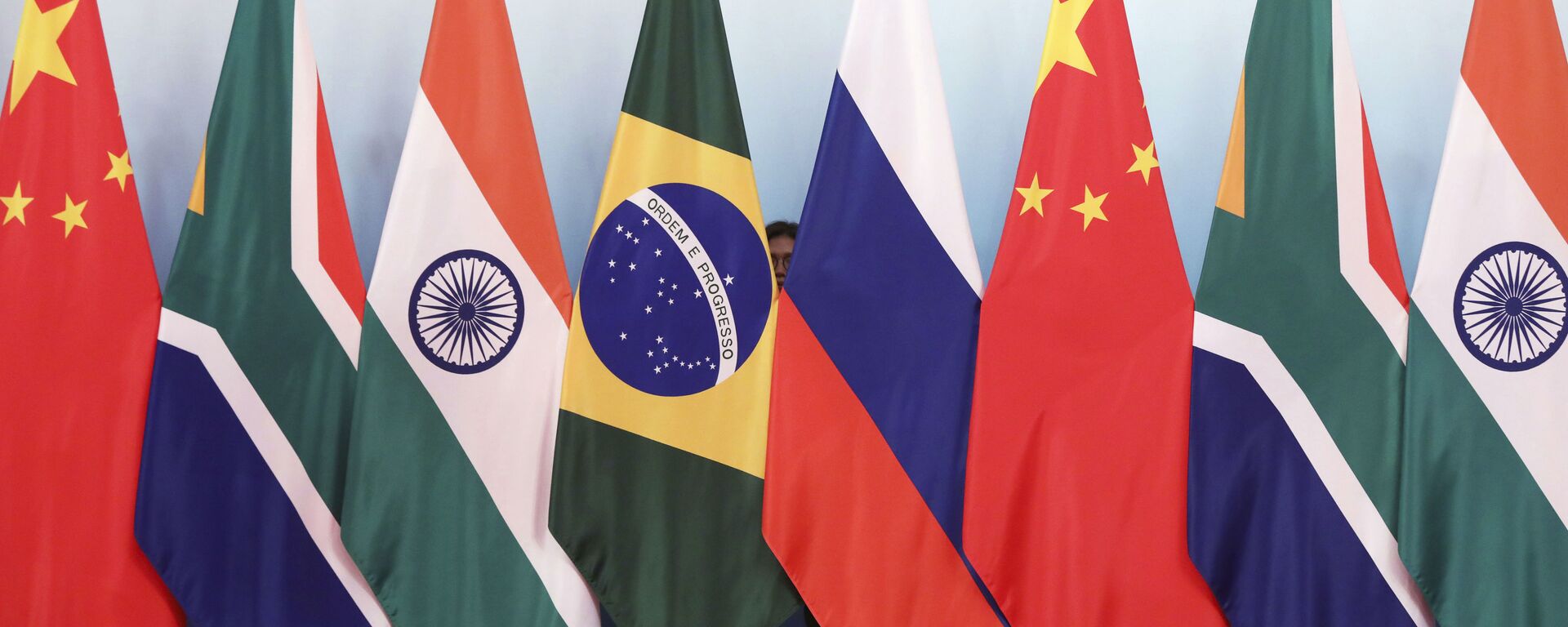https://sputnikglobe.com/20230609/a-new-world-order-looms--but-not-how-george-bush-imagined-1111027064.html
A 'New World Order' Looms — But Not How George Bush Imagined
A 'New World Order' Looms — But Not How George Bush Imagined
Sputnik International
The US and its fellow G& members are falling behind Russia, China and rest of the BRICS group economically. Dr Richard Wolff said the age of world dominance of Washington and the US dollar was drawing to a close.
2023-06-09T15:45+0000
2023-06-09T15:45+0000
2023-06-19T12:47+0000
richard wolff
economy
new world order
brics
china
europe
ukraine
russia
taiwan
https://cdn1.img.sputnikglobe.com/img/07e6/06/10/1096362387_0:217:3111:1968_1920x0_80_0_0_8e276a498c8ee3d21ea34f1c1ae70e68.jpg
The US empire is "doomed" as the world shifts to a new multipolar economic order, says an economist.The rise of the BRICS group of major emerging economies — Brazil, India, China, Russia and South Africa — to overtake the G7 in gross domestic product (GDP) terms has knocked the US off its perch as the sole financial superpower.Meanwhile Russia has challenged Washington's crumbling military hegemony in Syria and now Ukraine.Those events have shattered late US president George H.W. Bush's prediction in 1991 — when the Cold War appeared over — of a "new world order" dominated by his country.Dr Richard Wolff told Sputnik that "the truth of the matter is the unipolar is over.""I know this is difficult, particularly for Americans, to kind of wrap their heads around," since the US had been the world's leading economy since the end of the Second World War, but "any person with a grasp of history would have known and presumed that this wasn't sustainable."After almost a century of "dominance," the US is now "doomed" said the academic — and change is "happening fast.""Compared to what it was 50 years ago and compared even more dramatically to what it was ten and 20 years ago, the relative decline of the United States and its allies, the G7 versus China and its allies, the BRICS movement, it's spectacular," Wolff said.The BRICS are now the bigger and the richer and the better endowed of the two," Wolf stressed. "And that's changing the politics and the culture, and the people know it."The economist said the both the ruling Democratic Party and the Republicans were "practicing what psychologists call denial" and still "throwing their weight around militarily."One consequence — and measure — of the decline of US dominance is the undermining of the almighty dollar as the international reserve and trade currency.The academic explained that the pound sterling had previously held the that preeminent status when the British Empire dominated the world in the 18th and 19th centuries, but "when the British Empire faded out and got replaced about a century ago by the United States empire, the dollar replaced the British pound as the dominant currency.""20 years ago, at the beginning of this century, over 80 per cent of the reserves held around the world were reserves held in the US dollar," he noted. "Today, it's about half, somewhere between 45 and 50 per cent." That means the dollar "is just not the controlling currency and that loses the United States all kinds of leverage over other countries."For more incisive analysis of current affairs, check out our Sputnik News show The Critical Hour.
https://sputnikglobe.com/20230529/building-brics-of-new-world-order-saudi-push-to-join-brics-bank-will-benefit-kingdom-world-1110778405.html
china
ukraine
russia
taiwan
Sputnik International
feedback@sputniknews.com
+74956456601
MIA „Rossiya Segodnya“
2023
James Tweedie
https://cdn1.img.sputnikglobe.com/img/07e4/08/1c/1080307270_0:3:397:400_100x100_80_0_0_7777393b9b18802f2e3c5eaa9cbcc612.png
James Tweedie
https://cdn1.img.sputnikglobe.com/img/07e4/08/1c/1080307270_0:3:397:400_100x100_80_0_0_7777393b9b18802f2e3c5eaa9cbcc612.png
News
en_EN
Sputnik International
feedback@sputniknews.com
+74956456601
MIA „Rossiya Segodnya“
Sputnik International
feedback@sputniknews.com
+74956456601
MIA „Rossiya Segodnya“
James Tweedie
https://cdn1.img.sputnikglobe.com/img/07e4/08/1c/1080307270_0:3:397:400_100x100_80_0_0_7777393b9b18802f2e3c5eaa9cbcc612.png
george h.w. bush's 'new world order' speech, us hegemony failing in a multi-polar world, brics group of nations - brazil, china, india, russia and south africa, is the age of dollar dominance coming to an end?
george h.w. bush's 'new world order' speech, us hegemony failing in a multi-polar world, brics group of nations - brazil, china, india, russia and south africa, is the age of dollar dominance coming to an end?
A 'New World Order' Looms — But Not How George Bush Imagined
15:45 GMT 09.06.2023 (Updated: 12:47 GMT 19.06.2023) The US and its fellow G7 members are falling behind Russia, China and rest of the BRICS group economically. Economics professor Dr. Richard Wolff, host of the YouTube channel "Democracy at Work", said the age of world dominance of Washington and the US dollar was drawing to a close.
The US empire is "doomed" as the world shifts to a new multipolar economic order, says an economist.
The rise of the BRICS group of major emerging economies — Brazil, India, China, Russia and South Africa — to
overtake the G7 in gross domestic product (GDP) terms has knocked the US off its perch as the sole financial superpower.
Meanwhile Russia has challenged Washington's crumbling military hegemony in Syria and now Ukraine.
Those events have shattered late US president
George H.W. Bush's prediction in 1991 — when the Cold War appeared over — of
a "new world order" dominated by his country.
Dr Richard Wolff told Sputnik that "the truth of the matter is
the unipolar is over."
"I know this is difficult, particularly for Americans, to kind of wrap their heads around," since the US had been the world's leading economy since the end of the Second World War, but "any person with a grasp of history would have known and presumed that this wasn't sustainable."
"Every other empire, every other situation in history, when one country dominated, it didn't last. It may have lasted some decades," Wolff noted. "It may have even have lasted a century or two, but it never lasted beyond that."
After almost a century of "dominance," the US is now "doomed" said the academic — and change is "happening fast."
"Compared to what it was 50 years ago and compared even more dramatically to what it was ten and 20 years ago, the relative decline of the United States and its allies, the G7 versus China and its allies, the BRICS movement, it's spectacular," Wolff said.
"The BRICS is now the dominant economic unit. And the reason that's important is that it means that for every country in the world... there's now an alternative," the academic pointed out. "You have an option: you can sell to something other than the United States and its allies. You can buy from someone other than the United States and its allies. You can borrow money.
The BRICS are now the bigger and the richer and the better endowed of the two," Wolf stressed. "And that's changing the politics and the culture, and the people know it."
The economist said the both the ruling Democratic Party and the Republicans were "practicing what psychologists call denial" and still "throwing their weight around militarily."
"They're going to fight in the Ukraine against Russia. They're going to fight around Taiwan against China. We're struggling with Mexico about wanting them to buy our GMO corn, which is unsafe," Wolff said. "This kind of bullying, that's what you could do when you were the top dog. But it becomes ridiculous and dangerous when you're not."
One consequence — and measure — of the decline of US dominance is the undermining of the almighty dollar as the international reserve and
trade currency.The academic explained that the pound sterling had previously held the that preeminent status when the British Empire dominated the world in the 18th and 19th centuries, but "when the British Empire faded out and got replaced about a century ago by the United States empire, the dollar replaced the British pound as the dominant currency."
The dollar is currently "the currency of the overwhelmingly dominant society," but "As that dominance declines, then the importance of the dollar declines with it," Wolff warned.
"20 years ago, at the beginning of this century, over 80 per cent of the reserves held around the world were reserves held in the US dollar," he noted. "Today, it's about half, somewhere between 45 and 50 per cent." That means the dollar "is just not the controlling currency and that loses the United States all kinds of leverage over other countries."
For more incisive analysis of current affairs, check out our Sputnik News show The Critical Hour. 



